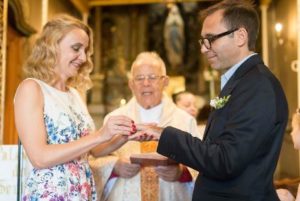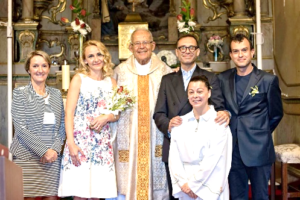– Brought to you by Fr. Bernardino Andrade (bernardinodandrade@gmail.com)

Dr. Vittorio Ventura (from Italy) and Beata Balazova (from Slovakia) have been, for a while, members of the Penha de França Community. Don’t ask them to read during Mass or to do anything in front of people because they will show their kind smile but they will decline the invitation. Not because they don’t like to help but only because, according to them, they are too shy. That’s why last Saturday when I invited them to take a special picture they said yes but with one condition. They had to wear a mask, ha… ha… ha… Well ! I think that we both exaggerated a little bit.
Any way if you come to the Sunday Mass and if you want to meet Vittorio and Beata don’t look for them among the «normal» community. If you want to meet them you have to climb a stairway and find them in the choir loft among a small group of shy people. They may be too shy but with a deep spirituality and a profound sense of community. But what I most admire in their spirituality is their option for the poor, for the suffering and for the «subversive» project of Jesus that is to «bring good news to the poor» (Lk. 4: 18). For them, this option is not negotiable. It is the center of their spirituality as it was the center of the Mission of Jesus and the center of the Bible.
Dr. Vittorio and Beata exchanged their Marriage vows in this Chapel last Saturday, April 14th. They had told me that it was going to be a small wedding, meaning a small number of attendants. It really was. Less than 10 people. But I have to tell you that it was the greatest Wedding ceremony I have ever performed during my entire life as a priest. What made this ceremony so special, besides the beautiful and different bride’s dress, so different and so beautiful, was that they decided to give their friends and guests an envelope, addressed to the “People Helping People” project and instead of wedding gifts they suggested a donation for the poor.

The returned envelopes were supposed to be anonymous. I confess that I have been smiling while writing this story. It has been written with a little bit of humor. But now I stopped smiling and have tears in my eyes. The result of the envelopes of that «small Wedding» was the amount of 900.00 Euros. Vittorio and Beata’s «small» Wedding ceremony was without any doubt the «greatest» Wedding ceremony of my entire life.
I strongly believe that when a couple makes room in their hearts for the poor, for the suffering, for God and for the world they are building a bigger room for their spouses. If in the hearts of a woman and a man who get married there is no room for Jesus, for the poor and for the world that means that they are two selfish people with shrinking hearts that take the risk of not finding room for each other anymore.
Congratulations Vittorio and Beata. You have been a 5th Gospel announcing to the world the arrival of the Kingdom of God. Have a happy journey.
Love and Peace,
Fr. Bernardino Andrade
PS. When I mention the 5th Gospel is because there are 4 Gospels of Jesus, according to Matthew, Mark, Luke and John. But I believe in the 5th Gospel. It’s the Gospel or Good News of Jesus Christ according to the life of each one of us. There are lots of people in the world who will never read Matthew, Mark, Luke and John. The only Gospel they will read is the life of each Christian. Martin Luther King said that the biggest tragedy of the world is not the evil done by evil people. The biggest tragedy of the world is the silence of the good people. The world needs to read these Good News.



